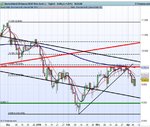Thats cool TJ but thats if youre offered the opportunity to get the second position on.
The point I was aiming at is the lack of value a stop offers and how the loss would be taken.
In the example:
The loss was booked at 20 for -30 (assuming there was no slippage).
The trader now has no position and no opportunity to seek better exit.
The market then went on to offer as much 45, a possible -5 for the trader who didnt use a 'stop'.
Both approaches would now have no position but would be free to take on another position if they get the opportunity. Its not the way i like to do things though.
If im long and averaged 20 units at 500 and the market puts in a move south. I end up averaged 20 units at 400 and ive booked -80 in doing so, then ive done well. If I book -30 or +50 ive done well. All depends on what the market offers you.
Another important point is that you always have a position, unlike the all in all out stop user. You cannot miss the favorable move.
Anyways. BJ seems happy enough 👍
Hey Dt, I have been doing this long enough now not to take a -30 hit, this would be totally unacceptable to me these days. If I enter long & spot the trap too late I would rather let it take my -5 to -8 (no pre-set stop) & let the trap play out. (believe it or not it has actually taken me ages to let the off side position go) If it drags down to -30 then I am in a position to take the second long position at a more favorable price.
This all depends of course how the play is presented, as often I will switch my bias..........the -5 to -8 loss can be flipped if the flow is truly down & my grey matter sees the obvious "do not fight it"......the short trade is then triggered, we all know how quickly the sick bucket is often needed, if it wants to poke a cluster of long stops hard & deep....then I want in !
Reverse scenario for the northward march.
One thing that has become second nature is reading Dma feed along side, well "you know what"
You are quite right in saying it all depends on what the market (or MM "you know what") offers us.
I guess for me, I personally want my money out of the market as much as possible, I want to know very quickly if my entry will be smashed to bits or not. They say scared money don't make money, well my experience so far has proved to me that if it smells like sh1t, it is sh1t......the whole cycle day in day out is a series of bluffs & double bluffs.
Day in day out I see this scenario, I do get where you are coming from & perhaps my method will see me picked to death one day (it happened last year, I lost control, so I never say never).
Ps "darkpool explained !!!" you are one sick puppy....keep em comin'


